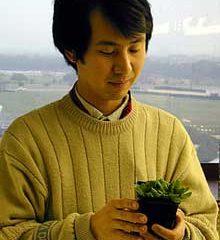
Patients who have had colorectal cancer may reduce their risk of suffering a recurrence by taking an aspirin daily, according to a new study conducted by a University of North Carolina at Chapel Hill physician and colleagues around the United States.
The study showed that subjects who took 325 milligrams of aspirin each day had a 35 percent lower risk of developing polyps in their colons during the period examined than did patients who received an inactive placebo. Polyps are considered pre

New work by researchers in the Kimmel Cancer Center at Johns Hopkins may allow them to halt the smoking-induced cellular events that lead to 99 percent of all small cell lung cancers (SCLC). The research is reported in the March 5, 2003, issue of Nature.
The researchers found that a primitive cellular pathway, called Sonic Hedgehog (named for the cartoon character and spiky hairs it develops on fruit flies) stays turned on long after it should be turned off in some lung cancers.
“

Long-time farmers’ friend shows promise against parasitic worms
Roundworms, hookworms, watch out. Scientists this week announced that a soil bacterium’s crystal proteins, long an effective weapon against many insect pests, are toxic to some nematodes, too.
The crystal proteins – created by some strains of Bacillus thuringiensis, more commonly known as Bt – thwart the development of some nematodes and kill others outright. The findings raise the possibility that thes

Information overload? It is becoming increasingly important for companies and developers to present complex coherences clearly and concisely. In order to structure the growing amount of information, new methods are being conceived at the man/machine interface. This is where GoVisual software, developed at the international caesar research center, comes into play. It automatically generates a clear layout for a number of different diagrams in a second; particularly for UML (Unified Modeling Language)

Biologists in Manchester have helped create a breakthrough in alcohol production that could save industry millions of pounds and help clean up the environment.
Many distilleries across Europe still rely on 19th century technology pioneered by Louis Pasteur, so the invention of a vastly more efficient fermenting system offers exciting possibilities.
The technology, developed at Manchester Metropolitan University (MMU), also allows continuous production of the chemical, an improvement from

Mutants from a lowly weed. That’s where many solutions to maladies – from salt stress in plants to HIV in humans – may lie in wait for scientists to discover.
“I look for mutants. I take a sick plant and find out what’s wrong,” said Dr. Hisashi Koiwa, Texas Agricultural Experiment Station horticulturist.
It’s the Arabidopsis plant, a common weed, that attracts Koiwa and other researchers because of its simple genetic makeup. Scientists have looked at every nook and cranny of the

For a wide variety of emerging quantum technologies, such as secure quantum communications and quantum computing, quantum entanglement is a prerequisite. Scientists at the Max-Planck-Institute for the Science of Light…

NASA’s Nancy Grace Roman Space Telescope is one giant step closer to unlocking the mysteries of the universe. The mission has now received its final major delivery: the Optical Telescope…

An international team that includes the University of Bath has discovered three ultra-massive galaxies (‘Red Monsters’) in the early Universe forming at unexpected speeds, challenging current models of galaxy formation….

Although it is the smallest and lightest atom, hydrogen can have a big impact by infiltrating other materials and affecting their properties, such as superconductivity and metal-insulator-transitions. Now, researchers from…

Known for its axon guidance properties, new research suggests protein is critical in guiding neural development. Scientists at the Eli and Edythe Broad Center of Regenerative Medicine and Stem Cell Research…

AI tool reads biopsy images… To determine the type and severity of a cancer, pathologists typically analyze thin slices of a tumor biopsy under a microscope. But to figure out…

Most people think of coffee cups, bathroom tiles or flower pots when they hear the word “ceramic”. Not so Frank Clemens. For the research group leader in Empa’s Laboratory for…

New ISTA assistant professor Julian Léonard makes abstract quantum properties visible. From the realm of the abstract to the tangible, the new assistant professor at the Institute of Science and…

Engineers in Australia have found a way to make stronger and crack-resistant concrete with scrap carpet fibres, rolling out the red carpet for sustainability in the construction sector. The research…

…quieting all sounds more than a few feet away. Imagine this: You’re at an office job, wearing noise-canceling headphones to dampen the ambient chatter. A co-worker arrives at your desk…

Carnegie Mellon University’s EgoTouch creates simple interfaces for virtual and augmented reality. The new generation of augmented and virtual reality controllers may not just fit in the palm of your…

Physicists create “light hurricanes” that could transport huge amounts of data. Much of modern life depends on the coding of information onto means of delivering it. A common method is…